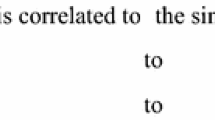Abstract
A century ago, Charles S. Peirce proposed a logical approach to modalities that came close to possible-worlds semantics. This paper investigates his views on modalities through his diagrammatic logic of Existential Graphs (EGs). The contribution of the gamma part of EGs to the study of modalities is examined. Some ramifications of Peirce’s remarks are presented and placed into a contemporary perspective. An appendix is included that provides a transcription with commentary of Peirce’s unpublished manuscript on modality from 1901.
Similar content being viewed by others
References
Bayart, A., ‘La correction de la logique de modale du premier et second ordre S5’, Logique et Analyse 1:28–44, 1958.
Bennett, J., ‘Iterated modalities’, Philosophical Quarterly 5:45–56, 1955.
Copeland, B.J., ‘The genesis of possible worlds semantics’, Journal of Philosophical Logic 31:99–137, 2002.
Drake, F. R., ‘On McKinsey’s syntactical characterizations of systems of modal logic’, Journal of Symbolic Logic 27:400–406, 1962.
Guillaume, M., ‘Rapports entre calculs propositionnels modaux et topologie impliqués par certaines extensions de la méthode des tableaux sémantiques. Système de Feys-von Wright’, Comptes Rendus des Séances de l’Académie des Sciences 246:1140–1142, 1958.
Hilpinen, R., ‘On C. S. Peirce’s theory of the proposition: Peirce as a precursor of game-theoretical semantics’, The Monist 65:182–188, 1982.
Hintikka, J., ‘Modality as referential multiplicity’, Ajatus 20:49–64, 1957a.
Hintikka, J., ‘Quantifiers in deontic logic’, Societas Scientiarum Fennica, Commen-tationes Humanarum Litterarum 23, Helsinki, 1957b.
Hintikka, J., Knowledge and Belief: An Introduction to the Logic of the Two Notions Ithaca, Cornell University Press, 1962. (Reprint edition London, King’s College Publication, 2005.)
Hintikka, J., Models for Modalities, D. Reidel, Dordrecht, 1962.
Jhonsson, B., and A. Tarski, ‘Boolean algebras with operators’, American Journal of Mathematics 73:891–939, 1951.
Kanger, S., ‘The morning star paradox’, Theoria 23:1–11, 1957.
Kanger, S., Provability in Logic, Stockholm Studies in Philosophy 1, 1957.
Kelly, G. A., The Psychology of Personal Constructs, Norton, New York, 1955.
Knuuttila, S., Modalities in Medieval Philosophy, Routledge, New York, 1993.
Krentel, W. D., J. C. C. McKinsey and W. V. Quine, ‘A simplification of games in extensive form’, Duke Mathematical Journal 18:885–900, 1951.
Kripke, S., ‘Semantical considerations on modal logic’, Acta Philosophica Fennica 16:83–94, 1963.
Kuhn, H., ‘Extensive games’, Proceedings of the National Academy of Sciences 36:570–576, 1950.
Lindström, S., ‘Quine’s interpretation problem and the early development of possible worlds semantics’, in E. Carlson and R. Sliwinski (eds.), Omnium-gatherum. Philosophical Essays Dedicated to Jan Österberg on the Occasion of His Sixtieth Birth-day Uppsala Philosophical Studies, Uppsala, 2001.
MacColl, H., ‘The calculus of equivalent statements (fifth paper)’, Proceedings of the London Mathematical Society 28:156–183, 1886–1887.
McKinsey, J. C. C., ‘On the syntactical construction of systems of modal logic’, Journal of Symbolic Logic 10:83–94, 1945.
McKinsey, J. C. C., ‘Notes on games in extensive form’, Research Memorandum 157, 1950.
Meredith, C. A., ‘Interpretations of different modal logics in the ‘property calculus’, mimeographed manuscript, Canterbury University College (with attribution ‘C. A. M., August 1956; recorded and expanded A. N. P.’). Reprinted as C.A. Meredith and A.N. Prior, ‘Interpretations of Different Modal Logics in the ‘Property Calculus’’, in B. J. Copeland (ed.), Logic and Reality: Essays on the Legacy of Arthur Prior, Clarendon Press, Oxford, 1996, pp. 133–134.
Montague, R. and Kalish, D., ‘That’, Philosophical Studies 10:54–61, 1959.
Morgan, C. G., ‘Modality, analogy, and ideal experiments according to C.S. Peirce’, Synthese 41:65–83, 1979.
von Neumann, J., and O. Morgenstern, Theory of Games and Economic Behavior John Wiley, New York, 1944.
Øhrstrøm, P., ‘C. S. Peirce and the quest for gamma graphs’, in Conceptual Structures: Fulfilling Peirce’s Dream, Lecture Notes in Artificial Intelligence 1257, Springer, Berlin,357–370, 1997.
Peirce, C. S., Collected Papers of Charles Sanders Peirce 8 vols., ed. by C. Hartshorne and P. Weiss (vols. 1–6), and A. W. Burks (vols. 7–8), Harvard University Press, Cambridge, Mass., 1931–1958.
Peirce, C. S., ‘Manuscripts’ in the Houghton Library of Harvard University, as identified by R. Robin Annotated Catalogue of the Papers of Charles S. Peirce (Amherst: University of Massachusettes Press, 1967), and in ‘The Peirce Papers: A supplementary catalogue’, Transactions of the C. S. Peirce Society 7:37–57, 1971.
Peirce, C. S., ‘Modality’, in J. M. Baldwin (ed.), Dictionary of Philosophy and Psychology vol. 2, Thoemmes Press, Bristol, 1998, pp. 645–650. (First appeared in 1901, Macmillan, The Macmillan Company New York and London, pp. 89–93. Partially available at http://psychclassics.yorku.ca/Baldwin/Dictionary/)
Pietarinen, A.-V., Signs of Logic: Peircean Themes on the Philosophy of Language, Games, and Communication, Synthese Library, Vol. 329, Springer, Dordrecht, 2005.
Pietarinen, A.-V., ‘Compositionality, relevance, and Peirce’s logic of existential graphs’, Axiomathes 15:513–540, 2005.
Rabin, M.O., ‘Effective computability of winning strategies’, in M. Dresher A.W. Tucker and P. Wolfe (eds.), Contributions to the Theory of Games 3, Princeton University Press, Princeton, 1957, pp. 147–157.
de Rijke, M., ‘The logic of Peirce algebras’, Journal of Logic, Language and Information 4:227–250, 1995.
Roberts, D.D., The Existential Graphs of Charles S. Peirce The Hague, Mouton, 1973.
Zeman, J. J., The Graphical Logic of C.S. Peirce dissertation, University of Chicago. (Online edition, 2002, http://web.clas.ufl.edu/users/jzeman/)
Author information
Authors and Affiliations
Corresponding author
Rights and permissions
About this article
Cite this article
Pietarinen, AV. Peirce’s Contributions to Possible-Worlds Semantics. Stud Logica 82, 345–369 (2006). https://doi.org/10.1007/s11225-006-8102-1
Issue Date:
DOI: https://doi.org/10.1007/s11225-006-8102-1




